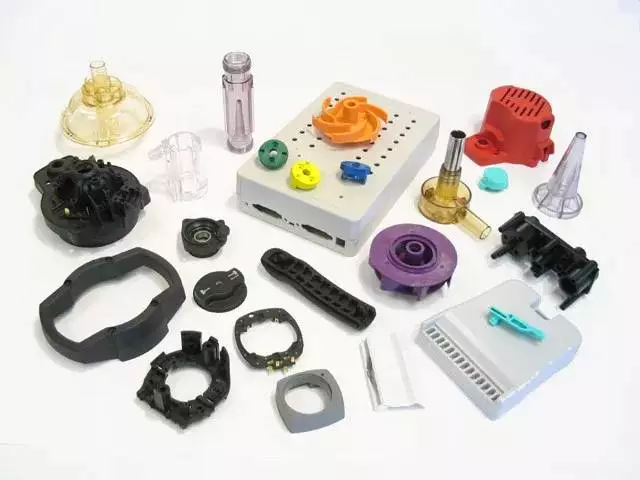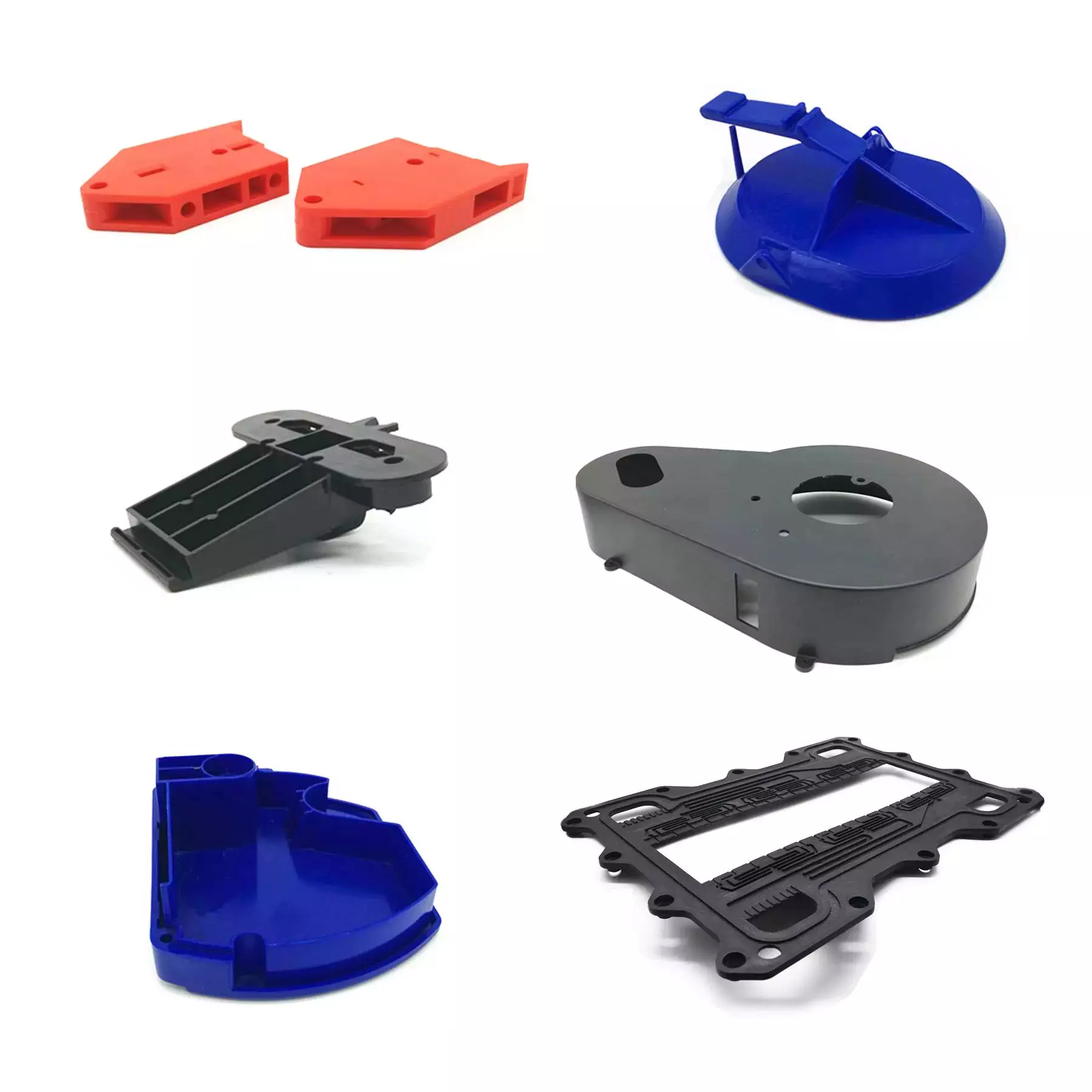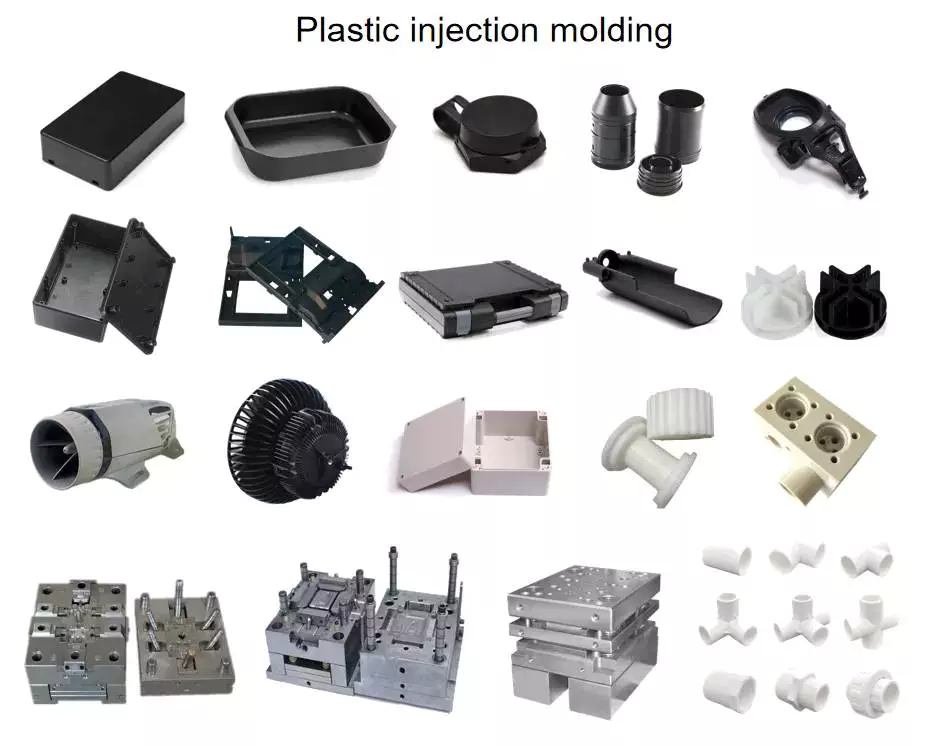Product Description
Our Service
We can offer the full range of service from product design,mold designing, making, plastic part molding to printing, assembly, package, and shipping arrangement.
*We have over 20 years production experience.
*Free Design Service:Sent us a physical sample our team provided free part design work.We also provided free mold design work after contract signed by both sides.
*Free Mold:Quantity reaches some amount, mold fee can be refund.
*Fast Mold:For simple and urgent mold,we can speed up to 15 days to finish mold and send out samples.
* In the service of plastic injection, Ideal plastic is more than just an injection molder.We provide solutions to manufacturing from start to finish.Our expertise enables us to provide clients with superior product by providing,highest quality in design, development, and solutions for precision injection molding and related manufacturing.
Custom Precision Plastic Injection Molding Services
We offers comprehensive custom plastic injection molding services to a wide range of industries. From low volume work to high volume production runs, we have the expertise and facilities to meet our customers’ contract manufacturing needs. We offer two shot, sandwich and insert injection molding as well as micro and gas assist molding. We have both 10K and 100K manufacturing facilities for those customers in the medical, pharmaceutical, food, beverage and electronics industries. Our comprehensive plastic injection molding abilities include machines with clamping forces from 18 to 3,000 tons, allowing us to produce nearly any plastic part including micro parts, thin-walled parts, and large components that require multiple shots.
We can source and mold any grade of material from typical commodity grade plastics, to engineering, functional, and structural grade materials in a variety of colors and formulations. In addition to injection molding, we offer many secondary services including sonic vibration, RF welding, hot stamping, etching, printing, plating, and packaging. Our manufacturing processes are highly automated, which allows us to run a precise and efficient production floor with minimal overhead costs. These capabilities allow us to provide fast and cost competitive manufacturing services to our customers without sacrificing precision and quality.
Products Case
Double-shot molding
Enclosure plastic injection molding Auto parts plastic injection molding Medical parts plastic injection molding
Our Advantages
1.Small details make big difference.All the parts from our company have no sharp edge. All dimensions are controlled
according to your drawings. Every product will be fully inspected and carefully packed to prevent the bump and rust in transit .
2. The craftsmanship of all parts we machined is controlled rigorously, Every product has its own process card and process chart.
3. Our quality inspection procedure is quite strict.it must self-inspected during production, we have flow inspectors and
professional inspectors.
4. Each size of product must be tested 1 by 1 after completing production.
If You Want To Create Something But No Ability To Design
You:I want to make a new product,but i only have hand made sketches,can anyone help me ?
Mogel:No worry at all.We have very
strong professional engineering and designing team,come to us,you will be in good hands.
I Have No Idea What Shoud I Do To Bring My Idea Into A Real Product
You:This is my first time to create a new product,i have no idea what should i do to make it happen.
Mogel:No worry at all.We will provide material suggestion and guide you through the design and cost evaluating stage,rest leave it
to us..
Company Profile
HangZhou Mogel Hardware & Plastic Co., Ltd. was founded initially as a Plastic injection molding and tooling fabrication plant from2006, afterwards growing quickly and set up Mogel Industry Limited in HK, we have several divisions,focusing on turnkey solutions inclusive of the CNC machining, Punching, Stamping and assembly .
In addition to being an OEM factory, we also have the capability of product research and development (R&D). We have industrial,mechanical and electronic design engineers We help our customers make their ideas become final products. Based on our extensive experience and deep understanding of mechanical and plastic components manufacturing,and now become a growing innovative mechanical , plastic components engineering design and manufacturing company.
Mogel group is proud to offer a comprehensive suite of compact and cost-effective products to our partners, monitoring and maintenance operations with the utmost in quality. Our factory are engaged in mechanical and plastic components manufacturing over 10 years with our goal to leverage on our synergetic capability to add value to our customer and grow the business together.
Strict inspection we do during operation
1. Experienced QC testers to check the products dimension, surface and performance according to drawings specification.
2. Experienced IQC to check the dimensions and surface of the incoming material.
3. Experienced PQC to inspect full-course during the processing.
4. Experienced FQC to inspect all the plating products from outsides and make the 100% inspection before the shipments.
Quality sample will be provided for your testing before production according to ISO 9001: 2008.
We are pleased to service you with excellent quality, reasonable cost and grow withyou together.
FAQ
Q1.How to have my components quoted ?
A1: Please contact us via TradeManager or Email and send us your drawings inclusive of 2D and 3D (.STEP or .IGE file) and detail requirements. We are pleased to CZPT NDA with you if you prefer. Then our engineering team will work on them and submit competitive quotation to you.
Q2.What is the lead time for tooling and samples fabrication?
A2: The exact lead time depends on your parts specification.
The normal lead time is 40*45 days for tooling fabrication and samples.
If the tooling is not required, the lead time for samples is 15 days normally.
Q3.Can I have prototypes for testing before tooling ?
A3: Yes, our factory have team to support prototypes with machining process to fabricate them for your testing.
Q4.How to ship the samples and production order ?
A4: We will normally ship samples via DHL, UPS or FedEX via our cooperated forwarder or freight collect. For the shipping of production order, it will be by sea or by air
Q5.How to ensure the quality of parts?
A5: Firstly, our team will inspect all incoming material. QC team will inspect parts while production and finished products, then submit Quality Inspection Report together with samples and production order.
| Plastic Type: | Thermosetting Plastic |
|---|---|
| Plastic Form: | Granule |
| Molding Method: | Injection Molding |
| Lead Time: | 25~35 Days |
| Surface: | Polishing or Custom |
| Material: | ABS, PC, PA66, Nylon etc. or Custom Material |
| Customization: |
Available
| Customized Request |
|---|

Factors to Consider When Converting a Design to Injection Molding
When considering injection molding for your design, there are several things you should consider. These factors include design, material selection, process, and reliability. In addition, you should consider the price of each part. The average cost per injection molded part is between $1 and $5. If you want to reduce your costs and improve your production cycle, look into converting your design to injection molding.
Design considerations for injection molded parts
Injection molded parts must meet certain design considerations to ensure quality and precision. Design considerations include proper material choice, process control, and tool design. In addition, designers must consider the tolerance ranges for the parts to be produced. These tolerances will differ from molder to molder, and designers should discuss their specific needs with their molders before they begin production. Designers must also consider possible revisions to the mold, such as making the part more or less tighter.
When designing injection molded parts, the designer should consider the thickness of each wall. This will minimize stresses that may arise due to uneven wall thickness. Parts with uneven wall thickness can develop sink marks, voids, and molded-in stresses. This can result in longer production time and increased cost. Moreover, irregular wall thickness can restrict material flow. To minimize these problems, designers should make the transitions between the different thicknesses smooth.
Another important design consideration is the use of bosses in injection molded parts. Bosses are typically used as points of assembly and attachment in injection molded parts. Bosses are cylindrical projections with holes for threaded inserts and other fastening hardware. Injection molded parts with bosses are generally able to accommodate multiple threaded inserts without stripping. These inserts are also durable and enable several cycles of assembly.
The thickness of the walls is another important consideration when designing injection molded parts. The thickness of walls will determine many key characteristics of the part. Careful consideration of this feature will prevent expensive mold modifications and delays. The nominal wall thickness should be determined based on the functional requirements of the part. Likewise, the minimum wall thickness should be set based on acceptable stress. If the walls are too thin, air will collect between them and compromise the functional performance of the part.
Material selection
Selecting the right material for your injection molded parts is an important part of the process. While there are many options, there are also many factors to consider. For instance, what kind of end product are you producing? Whether it’s a consumer part for your home or a complex part for the aerospace industry, you’ll need the right material for the job.
There are literally hundreds or thousands of types of plastic materials available for injection molding. One of the most common types is ABS, a polymer that has a high degree of structural strength and low cost. Another popular choice is polycarbonate, which offers excellent heat resistance and transparency. Alternatively, you can opt for Ultem, a high performance plastic that’s commonly used in medical and aerospace applications.
The process of designing plastic products involves a combination of art and science. The goal of this process is to create a high-quality product that meets the expectations of consumers. By doing this, you’ll reduce production costs and increase profits. It’s not an easy process, but it’s well worth the effort.
Injection molding is an efficient and versatile method of manufacturing medical devices. It can be done in high volumes and with high flexibility. In addition to this, it also offers a broad range of materials. This is important when your parts need to be made of different materials with unique physical properties. For example, if you’re producing toys, you’ll want to use Acrylonitrile Butadiene Styrene (ABS). ABS is also a great option for medical applications because it can withstand the high temperatures and pressures of medical environments.
When choosing plastic injection molding materials, keep in mind the weight and stiffness of the material. Some applications require hard plastics, while others require softer materials. In addition, the material’s flexibility will determine how much you can bend it.
Process
 Injection molding is a process in which plastic parts are formed by pressing melt into a mold. The process takes place in two stages. During the first step, the material is injected and heated, while the second stage is when the mold is opened and the part ejected. The part is then finished and ready for use.
Injection molding is a process in which plastic parts are formed by pressing melt into a mold. The process takes place in two stages. During the first step, the material is injected and heated, while the second stage is when the mold is opened and the part ejected. The part is then finished and ready for use.
The material used in injection molding is made from a variety of polymers. Common polymers include nylon, elastomers, and thermoplastics. Since 1995, the number of materials used in injection molding has increased by 750 percent. Some materials are newly developed while others are alloys of previously-developed materials. The selection of material primarily depends on the strength and function required by the final part. Also, the cost of the material is a critical factor.
The design of custom components for the molding process should be carried out by a skilled industrial designer. There are a number of design guidelines for plastic parts, which should be followed carefully to achieve high quality and dimensional accuracy. Failure to follow these guidelines can lead to undesirable results. Therefore, it is crucial to specify specific requirements for the parts before the process begins.
The process is reliable and highly repeatable, making it ideal for large-scale production. Injection molding also allows for the creation of multi-cavity injection mold parts, which can create several parts in one cycle. Other advantages of the injection molding process include low labor costs, minimal scrap losses, and low post-mold finishing costs.
Before beginning the full production run, technicians perform a trial run. In this test, they insert a small shot weight in the mould. Then, they apply a small holding pressure and increase the holding time until the gate freezes. Then, they weigh the part to check if it is right.
Reliability
Injection-molded parts are subject to a variety of defects. One of the most common is unwanted deformation. This may happen when the temperature of the mold is too high or there is not enough plastic injected into the mold. Another problem is millidiopter range distortion. This distortion is invisible to the naked eye, and cannot be detected by manual inspection. Regardless of the cause, preventing unwanted deformations is critical for the long-term performance of the part.
The process of creating a custom mould for a plastic component requires great skill. Creating a mould that is perfectly suited to the product is important, because a good mould is crucial in avoiding potential defects. Traditionally, this process relied on the skill of a toolmaker and trial-and-error methods. This slows down the process and increases the cost of production.
Another factor contributing to injection molded parts’ reliability is the high level of repeatability. Injection molding is ideal for high volume production, because parts are easily re-molded. However, the process can be prone to failure if there is no quality control. While most injection-molded parts will last for a long time, parts that are prone to wear will eventually fail.
Besides high level of consistency and reliability, injection-molded parts are also eco-friendly. Unlike other manufacturing methods, the injection molding process produces little to no waste. Much of the plastic left behind in the process can be recycled, making it a green alternative. Another benefit of this manufacturing method is automation, which helps reduce production costs. Overall, injection molding is a highly reliable and consistent product.
Injection molding requires precise measurements and a 3-D model. It is also important to check for wall uniformity and draft angles. Properly-designed parts can avoid deformations. If the wall thickness is too low, support ribs can be used. Proper draft angles are important to ensure that the part can be removed easily from the mold.
Cost
 The cost of injection molded parts depends on many factors, including the complexity of the part and the mold design. Simpler designs, fewer CAD steps and simpler processes can help companies minimize costs. Another factor that affects the cost of injection molded parts is the geometry of the part. In general, complex geometries require more design work and tooling time. Additionally, thicker walls require more material than thin ones, which raises the cost of the part.
The cost of injection molded parts depends on many factors, including the complexity of the part and the mold design. Simpler designs, fewer CAD steps and simpler processes can help companies minimize costs. Another factor that affects the cost of injection molded parts is the geometry of the part. In general, complex geometries require more design work and tooling time. Additionally, thicker walls require more material than thin ones, which raises the cost of the part.
The amount of plastic used in the mold is also a key factor. Injection molding requires large quantities of material, so parts that are larger will require a larger mold. Larger parts are also more complex, so these require more detailed molds. A mold maker will be able to advise you on how to design your part to cut down on costs.
The next major factor affecting the cost of injection molded parts is the material of the mold. Most injection molds are made of steel, but the type and grade of steel used is important. Additionally, tight tolerances require molds with virtually wear-free interior cavities. Hence, higher-grade steel is required.
Another factor affecting the cost of injection molded parts is the price of mold tools. Depending on the size and complexity of the part, the cost of molding tools can vary from $10,000 to several hundred thousand dollars. Injection molding tooling is an integral part of the entire process and can add up to a significant portion of the overall cost of the part.
Draft angles are another factor that affects the cost of injection molded parts. A draft is an important design element as it allows for easy part separation and removal from the mold. Without a draft, it would be very difficult to remove a part after injection.

editor by CX 2023-04-18